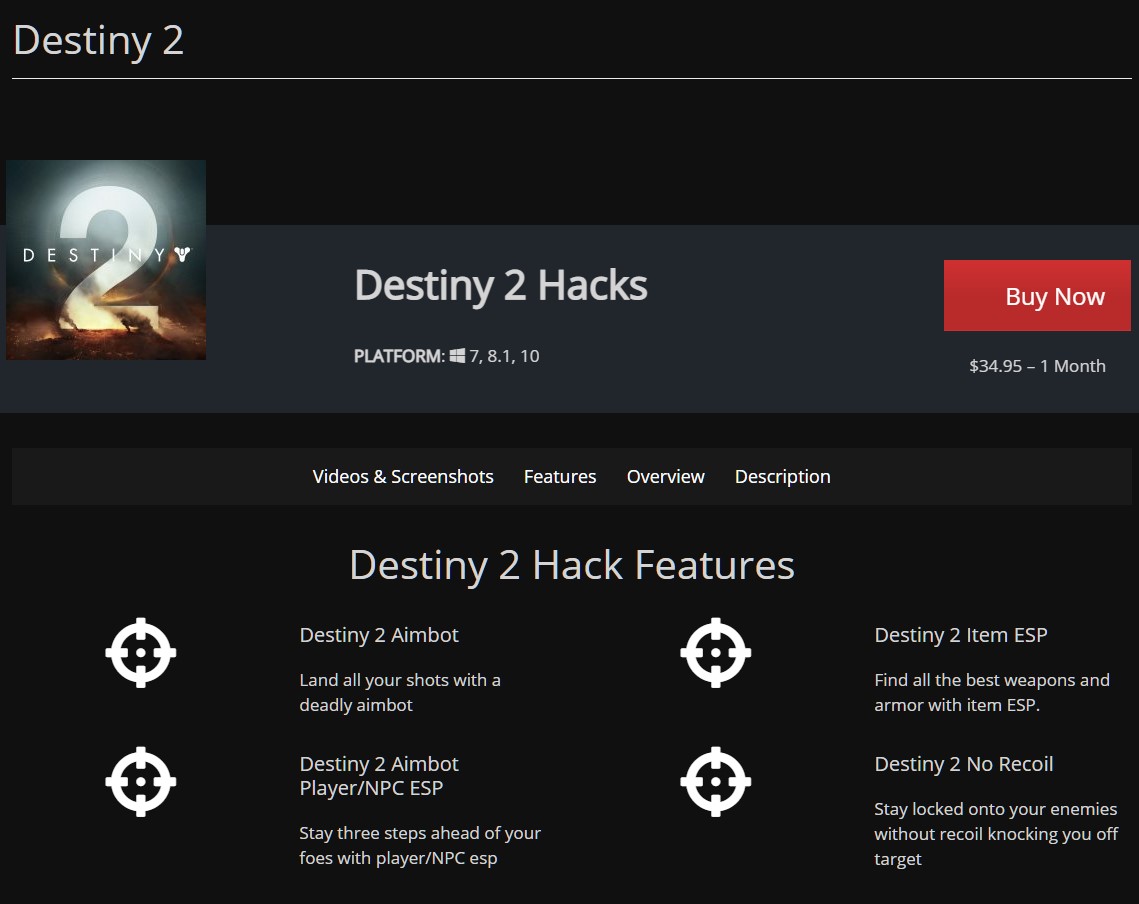Most people agree that cheating is an unfair way to win at online video games, but do cheating tools actually break the law? This question is at the center of a landmark trial currently underway between cheat maker AimJunkies and Destiny 2 creator Bungie. Among other things, the jury must decide whether the cheat maker infringed the game's copyrights.
Over the past several years, game companies have pursued legal action against both cheaters and cheat makers.
Rightsholders have mostly emerged from these lawsuits as victors, but until now, none have gone all the way to a full trial.
The legal dispute between American video game developer Bungie and AimJunkies.com has been fiercely fought, and the long-awaited jury trial is now underway.
Three years ago, Bungie filed a complaint at a federal court in Seattle, accusing AimJunkies of copyright and trademark infringement, among other things. The same allegations were made against Phoenix Digital Group, the alleged sellers of the Destiny 2 cheating software.
The case initially seemed set for a quick settlement, but the parties failed to reach an agreement. Instead, Bungie pressed on while AimJunkies went on the defensive, asking the court to dismiss several claims.
AimJunkies stated that cheating isn’t against the law and refuted the copyright infringement allegations; these lacked substance and were ungrounded because some of the referenced copyrights were registered well after the cheats were first made available, AimJunkies argued.
Dismissal, Hacking and Arbitration
In 2022, District Court Judge Thomas Zilly largely sided with AimJunkies. The original complaint failed to provide sufficient evidence for a plausible claim that the ‘Destiny 2 Hacks’ infringed copyright.
This was bad news for Bungie but the court did offer the company the option to file a new complaint to address these shortcomings, which it did shortly after.

Meanwhile, AimJunkies wasn’t sitting idly by. The cheat seller filed a countersuit, accusing Bungie of hacking when it allegedly accessed a defendant’s computer without permission. This hacking counterclaim was eventually dismissed for AimJunkies, but not for developer James May.
Bungie scored its first major win last year in an arbitration proceeding. Judge Ronald Cox concluded that the cheaters violated the DMCA’s anti-circumvention provision and related trafficking restrictions, awarding $3.6 million in damages to the game company. This arbitration award is still under appeal.
At the same time, Bungie continued its copyright and trademark claims. The game company submitted motions for summary judgment to resolve the copyright infringement dispute before trial. However, the court denied these motions, as there is no hard evidence that any game code was copied. Instead, a jury would have to decide.
Jury Trial
After several years, the dispute is about to reach its climax in a district court in Seattle, where a jury trial started this week. This is the first time that a case like this has gone before a jury, making it a landmark event.
While both sides have yet to complete their pleadings, shots were already fired during the first days, as Law360 reports.
In court, AimJunkies’ attorney Philip P. Mann, of Mann Law Group argued that the developers, who allegedly created the cheats, never had access to Destiny 2’s source code. Instead, the cheat accessed object code, which is the ‘compiled’ output of the source code.
While this distinction may be quite abstract for the layman, the defense believe it’s crucial for the copyright infringement allegations.
AimJunkies’ attorney questioned Edward Kaiser, lead engineer of Bungie’s project security team, on the matter, insinuating that the copyright infringement allegations can’t stand if there’s no evidence that the copyrighted code was accessed.
“Would you agree with me that you can’t copy something that you don’t see or that you don’t have access to?” AimJunkies counsel asked.
Kaiser responded by characterizing this as an ‘apples and oranges’ comparison. According to Bungie’s witness, the cheat makers might not have accessed the source code, but they “definitely” had access to the object code, which was key in creating the cheat.
Developer Denies Accusations
The jury also heard from third party developer James May, who isn’t part of AimJunkies’ main team. The developer allegedly had a key role in creating the Destiny 2 cheat, but refuted this in court.
May told the jury that, contrary to Bungie’s claims, he did not code the cheat software. May admitted that he tried to reverse engineer the Destiny 2 code, but added that he “didn’t get anywhere.”
The developer also has an active counterclaim against Bungie, which he accuses of hacking into his computer, violating his privacy. This counterclaim survived the earlier motion to dismiss and remains open for the jury.
Bungie, meanwhile, presented a spreadsheet with logging data that purport to show May’s “relentless” efforts to reverse engineer the code. He allegedly used more than 80 different accounts to do so, often using the ‘swifty’ alias.
“Mr. May distinguished himself as someone who kept coming back, time after time,” Kaiser added, during his testimony.
According to Bungie’s engineer, the game company first noticed the cheat in October 2019, when its internal monitoring systems were triggered. This suggested that players attached reverse engineering tools to explore the game’s memory space, which is often indicative of cheating.
While it’s clear that AimJunkies sold Destiny 2 cheats at some point, it’s undecided whether the company, its directors, or accomplices, broke any laws doing so. That’s up for the jury to decide.
These are just a few of the arguments brought up at trial. Hearings are ongoing and both sides still have several hours of pleading time left. The trial is expected to wrap up this week, after which the verdict will follow.



3175x175(CURRENT).thumb.jpg.b05acc060982b36f5891ba728e6d953c.jpg)
Recommended Comments
There are no comments to display.
Join the conversation
You can post now and register later. If you have an account, sign in now to post with your account.
Note: Your post will require moderator approval before it will be visible.